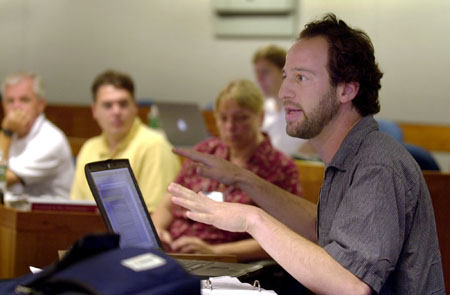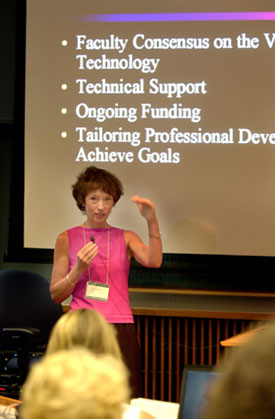Technology for educators
Five-day institute helps make for tech-savvy educators


Glenn Kleiman recalls the time his 7-year-old son asked him when color was invented.
It soon became clear that his son was not asking about color film or color TV or even color computer monitors. He wanted to know when color itself – red, yellow, blue, orange, purple, green – was introduced into a previously black-and-white world.
“It was a perfectly logical question because everything he’d seen that depicted the world of the past – movies, photographs – was in black and white. It shows what a tremendous part media plays in the lives of children today.”
For Kleiman, an instructor at the Graduate School of Education (GSE), the fact that media and technology play such important roles in children’s lives makes it imperative that teachers become technology-savvy and that decisionmakers in schools-principals and superintendents-understand the potential of technology to transform learning and teaching. To a large degree, technology has changed the very nature of teaching and learning, and unless educators can keep pace with those changes, they may become less effective in preparing their students for the adult world.
“Children today take it for granted that they can find an almost infinite amount of information on almost any subject on the Internet. Rather than learning to find information, they need to learn how to filter information, which is a whole different process,” Kleiman said.
This summer, Kleiman helped organize a five-day institute to aid teachers, principals, and superintendents in grappling with the problems of using the newest technologies to the best advantage. “Leadership and New Technologies: Shaping the Learning Community of the Future” ran from July 30 to Aug. 3 at the Graduate School of Education. The institute was supported by a grant from the Bill and Melinda Gates Foundation.
The institute dealt with such topics as the use of computers to enhance literacy and teach reading and writing skills, technology and the quest for more equitable schools, online interactive environments, “e-mentoring,” school and classroom design, professional development, and virtual internship programs.
Throughout the institute, participants were asked to imagine what they would like their schools to “look like” in 2006 and how they planned to achieve that vision.
This institute followed a series of summer programs held at the GSE from 1997 to 1999 and funded by AT&T. But the 2001 institute addressed different concerns.
“Those earlier programs dealt with the policies and decision making involved in integrating technology into the schools, starting from almost nothing,” said Linda Greyser, associate director of programs in professional education at the GSE. “This institute is for educators in districts that have installed computers over the past decade and have integrated them into school programs at a moderately well-functioning level. But in the meantime, there have been new technological advances and new applications that enhance the learning process, so you have to rethink strategically how technology is applied in the classroom.”
The extent to which technology has leapt ahead, making new learning experiences possible, was illustrated by some of the presentations at the institute, Greyser said.
In addition to the use of laptop computers, there have been remarkable advances in hand-held devices. For example, in one school, students in a biology class were sent into the field with personal digital assistants (PDAs) fitted with miniaturized digital video cameras. This technology enabled students to make visual recordings of natural phenomena and bring them back to class for analysis and interpretation.
“We have to ask ourselves, ‘What does this mean for education?’” Greyser said.
Giving students the opportunity to take advanced courses online is another area that needs further exploration, Greyser said. The Concord Consortium, a group located in Concord which offers more than 200 courses taught by high school teachers all over the country, was one of the groups presenting at the institute.
Another group from Burlington demonstrated their techniques for teaching music with computers through the digitization of musical sound.
The importance of such high-tech learning is underlined by the changing nature of work in our society, which is causing unskilled labor to be increasingly marginalized.
“It used to be that if you had few skills, you could always get a job on the assembly line or doing manual labor,” said Kleiman. “But increasingly those repetitive, noncognitive, nonproblem-solving jobs are being done by machines. To get along in the world of the future, it’s going to be essential for kids to develop high-tech skills.”




